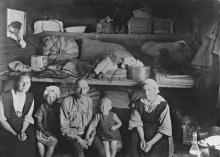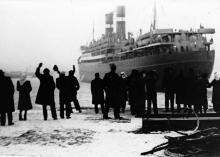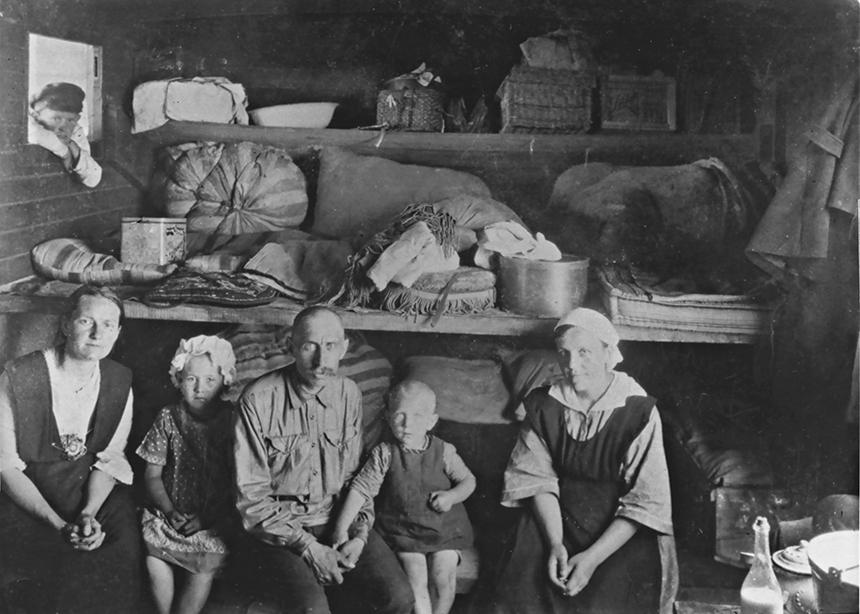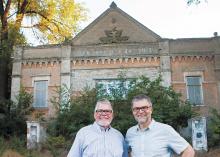“At the railroad stations, the sight was appalling. The moment the train halted it was besieged by living skeletons. From out of the rags were lifted bare arms, the wasted fingers extended toward the car windows in entreaty for food.
“‘Bread, in God’s name, bread!’ ”
These were the words of A.J. Miller, penned in southern Russia (present-day Ukraine) in 1920. Thousands were suffering in the wake of the Russian Revolution.
Mennonites in Canada and the United States heard the pleas of their distant cousins. “What can be done?” they asked.
Mennonite groups knew they would need to work together to accomplish the daunting task ahead. But inter-Mennonite cooperation had always been hindered by differences in theology, practice, culture and language. It was hard to imagine a jointly owned effort.
Nevertheless, the biblical call was clear: “As we have opportunity, let us do good to all people, especially to those who belong to the family of believers” (Galatians 6:10, NIV). There was no choice other than to respond—to be the hands and feet of Jesus to strangers. To become the living gospel.
Five Mennonite denominations agreed to form a temporary “central” committee to gather and distribute relief supplies. Mennonite Central Committee (MCC) was born. It was July 27, 1920.
Not surprisingly, this fledgling agency faced obstacles. Clayton Kratz, one of the first three workers sent by MCC to oversee the relief efforts, was arrested by the Red Army and disappeared without a trace. Delays in food shipments meant the first relief kitchens couldn’t open until March 1922. And the local government insisted that MCC clothe and feed all people in need, not just Mennonites.
For 100 years, MCC has upheld the clear and urgent call to help those in need regardless of nationality, race or creed. It has been a “big tent” under which Mennonites and Brethren in Christ (now known in Canada as Be in Christ) have gathered to work together toward a common mission. And its service has been influenced by a spirit of generosity, tenacity and sacrifice.
Beyond relief
Corn meal, dark bread and warm cocoa. These carefully measured calories were the life-saving rations fed to starving families in the MCC relief kitchens run by Jacob and Anna Funk.
The Funks were part of the masses who knew hunger. They had been forced to sell their wedding rings to buy food, sometimes eating meals of roasted gophers or crows. They said they felt guilty when they received double rations of food. But they knew they needed strength for the strenuous work of overseeing the kitchens.
By May 1922, MCC was feeding up to 25,000 people daily.
The following year, MCC began its first development work, shipping 25 Fordson tractors and ploughs to help farmers plant and harvest new crops.
But, for many, this wasn’t enough to secure a future in the region. It was time to migrate. And so MCC began the work of assisting refugees and immigrants—by the thousands—to Canada, Paraguay and other locations.
The focus on displaced people has been another hallmark of MCC’s work over the past century. Shaped by the biblical call to hospitality and “welcoming the stranger” (Matthew 25:35), MCC has coordinated immigration efforts. It has also worked with communities to provide relief and support for people living in places they don’t call “home.”
This work has often led MCC into the halls of Canadian power. In 1922, the Canadian Mennonite Board of Colonization (CMBC, which later became part of MCC Canada) met with Prime Minister William Lyon Mackenzie King, securing a place for thousands of Mennonites hoping to immigrate to Canada.
At the same time, CMBC negotiated an agreement with the Canadian Pacific Railway (now CP Rail) for those families to travel on credit rather than paying their fares up front. Between 1923 and 1930, some 20,000 Mennonites came to Canada with the help of CMBC and CP Rail.
Celebrating 100 years
A century later, the work of “relief, development and peace in the name of Christ” continues. There is still much to be done. The need to bring Christ’s love and hope to people around the world is as urgent as ever. The number of displaced people has reached record highs, and a cry for bread still rings in the air. The need to work together remains.
MCC is grateful for God’s leading over the past century, for faithful and generous supporters who have journeyed with the organization, and for knowing the “temporary” committee formed back in 1920 endures today.
This is the first in a series of three articles that will appear in Canadian Mennonite throughout 2020. To learn more about MCC’s yearlong centennial celebration and how to get involved, visit mcccanada.ca/centennial.
Related stories:
Sharing stories that spell MCC
Great Winter Warm-up produces 9,400 comforters
Watch: MCC is 100
MCC celebrates, serves where its work began
MCC board approves five-year strategic plan

An interior view of a refugee train with a family of Mennonites from Schoenwiese, southern Russia (present-day Ukraine). (MCC photo by A.W. Slagel)

Mennonite refugees leave the harbour at Bremerhaven, Germany, on the Volendam in 1947. The group, led by Peter and Elfrieda Dyck, was the first of three groups of Mennonite refugees transported by the Volendam to South America in 1947 and 1948. Throughout the 1930s and ’40s, MCC helped resettle thousands of Mennonite refugees from Europe. (MCC photo)




Comments
I recently read "My Emigrant Father" by Katie Funk Wiebe and was completely captivated by the story of Katie's parents, Jacob and Anna Funk who are mentioned in this article. Like so many Mennonites in their early years in Russia, they suffered so much hardship. Yet they persevered in their faith and received miraculous blessings which doubtlessly points to the presence of God in their lives. While I had a personal interest in obtaining the book because Jacob Funk was my mother's cousin, I would recommend it to anyone who wants to learn more about our Mennonite ancestors' way of life in Russia. Not only through the hard times, but also the good times prior to the Russian Revolution.
As a descendant of Russian Mennonites who arrived in Rosthern, Saskatchewan in 1923, I have always been fascinated about the logistics of how my grandparents came to Canada. The efforts of the MCC during the 1920s were truly heroic and their legacy enormous. I hope that the MCC is acknowledged in Canada's immigration history. Looking forward to more excellent articles about the MCC's early history in Russia.
Add new comment
Canadian Mennonite invites comments and encourages constructive discussion about our content. Actual full names (first and last) are required. Comments are moderated and may be edited. They will not appear online until approved and will be posted during business hours. Some comments may be reproduced in print.